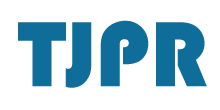
Identification
of Counterfeit Drugs by Community Pharmacists in Lagos State
*aValentine
U. Odili, bSylvia Osemwenkha, cEsther
U. Eke
and dHenry A. Okeri
aDept, of Clinical Pharmacy & Pharmacy Practice, Faculty of Pharmacy, University of Benin. Benin City, bInstitute of Public Administration & Extension Services, University of Benin, Benin City, c,dDept. of Pharmaceutical Chemistry, Faculty of Pharmacy, University of Benin, Benin City.
Tropical Journal of Pharmaceutical Research 2006; 5(1): 545-550
ISSN: 1596-5996
Abstract
Purpose: The
problem of fake and counterfeit drugs is real and constitutes a major threat to
the health and safety of the Nigerian population. A descriptive study was
carried out to assess the methods of identification of counterfeit drugs by
community pharmacists in Lagos State.
Methods:
The research instrument was a 23-item questionnaire, which was
administered to consenting community pharmacists in 17 out of the 20 Local
Government Areas in Lagos State.
Results: All the respondents agreed that
there is a fake and counterfeit drug problem in Nigeria, and (74%) considered
this a major problem. The respondents commonly used visual security techniques
before drug purchasing. These were: Seals/embossments (83%), character of print
(77%), and Holograms (68%).The respondentsí most likely action after a
counterfeit drug encounter was to return the drug back to the supplier.
Conclusion:
The study showed that pharmacists sampled were aware of the prevalence of
fake and counterfeit drugs and quite a number of them have had encounters with
them. There is an indication that the respondents try to assure themselves of
the quality of the drugs they purchase by use of several methods. However, no
rigorous effort was taken to confirm as well as report suspected fake and
counterfeit drugs to regulatory authorities.
Keywords: Community pharmacists, drug identification, fake and counterfeit drugs.
To whom correspondence should be addressed: E-mail: vuodili@yahoo.com Tel +2348023432237
|
|
||
|
||
|
|
||
|
||
|
e-mail
Alert |
||
|